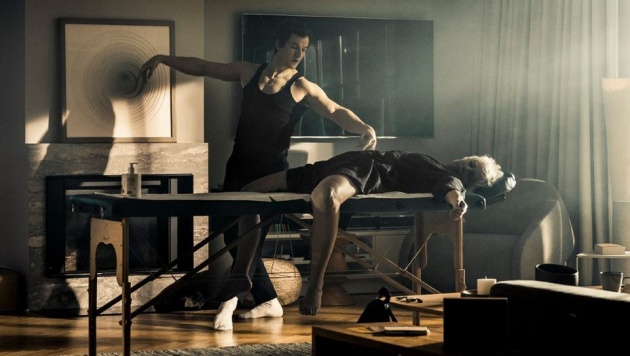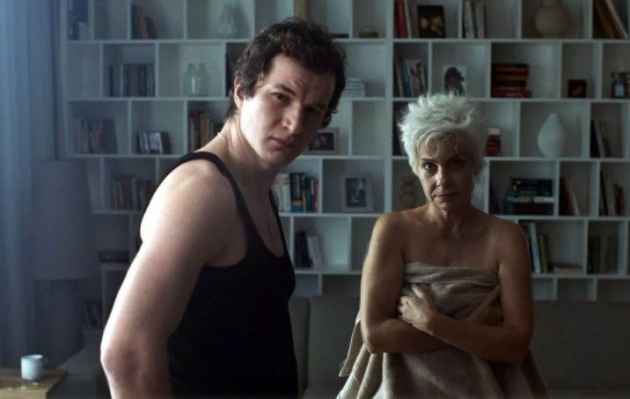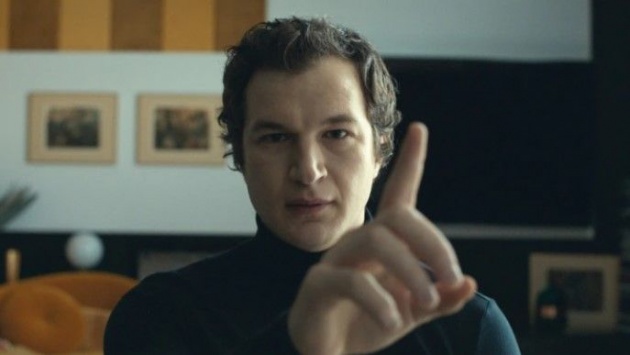
Pictured: 'Concentrate on the dot? I'd rather dance.' Zhenia (Alex Utgoff) pirouettes next to a sleeping client (Agata Kulesza) in the Polish film, 'Never Gonna Snow Again', written and directed by Małgorzata Szumowska and Michał Englert. Still courtesy of PictureHouse Entertainment (UK) / Kino Swiat (Poland)
Back in 2020, when the Polish film Never Gonna Snow Again (Śniegu juž nigdy nie bedzie) debuted at film festivals, it resonated differently than it does now. Two years on, its Ukrainian protagonist is classified as belonging to a brave nation willing to defend its values to the point of annihilation against the paranoid ravings of a Russian President. Zhenia (Alec Utgoff, who projects the air of an East European Patrick Swayze, and looks good in a leotard too) is a masseur whose clients belong to a gated community of wealthy but troubled families who live just outside an unnamed city. Zhenia walks from his apartment, with its broken set of blinds, all the way to his place of work, symbolically passing through a traffic barrier. Here lies a community whose children are sent to the École Française, not because the parents speak French but because they want their children to do so. Every doorbell is classically themed, every door decorated with a wreath.
Director Małgorzata Szumowska, who co-writes and shares direction credit with the cinematographer, Michał Englert, has previously made a film about a charismatic man amongst a group of young women, The Other Lamb, her English language debut released in 2019. She has since made her second English language film, Infinite Storm with Naomi Watts and has another film, All Inclusive, in post-production – Szumowska is one of the busiest female directors working in cinema today. Her films are, for the most part, not strong on plot. They work on a slow burn and leave the audience to ponder their themes.
Here the charismatic stranger, Zhenia, is more benevolent than The Other Lamb’s Shepherd (Michiel Huisman). When we first meet him, Zhenia steps out of the woods – the camera tilts up from black and reveals him in long shot – before he walks away from us through a barren urban landscape, riding an elevator by himself, crossing a bridge while appearing to affect the lighting and walking through a tunnel. We see him climb the crowded stairs of a municipal building and present himself to an official. ‘I want to work here,’ he tells the elderly gentleman, whose office he enters without knocking. The elderly official looks at Zhenia. ‘You’ve been here before.’ Zhenia walks behind the man, puts his hands on the man’s ears then sends him to sleep. He signs and stamps his own form, before edging his way downstairs. The opening of the film is almost forgettable; we never see this space again. For the most part, the action takes place in a well-appointed estate of white-walled houses. No graffiti, no evidence of economically driven social ills. There are, however, pampered children, alcoholism, loneliness and cancer.
How does Zhenia get his first customer? It isn’t clear. In any case, the film operates outside realism. In two scenes, Zhenia appears to have a telekinetic power to make objects move by themselves, though this gift is never used for dramatic purposes. His clients are mostly women: housewife Maria (Maja Ostaszewska), first seen in a balloon-and-bottle-filled house, the morning after a birthday party, nudging her school-age son with her foot. Her husband picks the boy up. Maria has a young daughter who demands juice and an i-pad and calls her mother a ‘whore’. Silver-haired Ewa (Agata Kulesza) has a son, who watches Zhenia dumbfounded as he pirouettes, ballet style around the house, having put Ewa to sleep after she requests sex. The most sympathetic character is a father (Lukasz Simlat) who seeks relief from his cancer; his wife, Wika (Weronika Rosati) looks at Zhenia sympathetically. Finally there is a woman who keeps three bulldogs (Katarzyna Figura) who asks Zhenia to massage one of them. ‘I’ve never messaged a dog before,’ protests Zhenia before getting to work. The dog farts in Zhenia’s face.

Pictured: Wonder masseur Zhenia (Alex Utgoff) and client Ewa (Agata Kulesza) in a scene from the Polish film 'Never Gonna Snow Again', written and directed by Małgorzata Szumowska and Michał Englert. Still courtesy of PictureHouse Entertainment (UK) / Kino Swiat (Poland)
There is tension. Zhenia is told by a neighbour that two men are looking for him. Maria sees Zhenia with another woman and is jealous. There is an army man (Andrzej Chyra) who has just moved in, whose car collides with the bike of a local youth. He eventually hires Zhenia. During the massage, the man’s life as a UN Peacekeeper flashes before us. Does Zhenia experience this insight or is this flashback just for our benefit? It isn’t entirely clear.
Dog farts aside, Zhenia’s impromptu dance is one of the few comic sequences. In another, Zhenia tries to engage Maria’s son is conversation. ‘Are you a football fan?’ he asks, adding that his favourite team is Shakhtar Donetsk. The boy freaks out. There is a running motif of men on Segways patrolling the estate. Late in the film, Zhenia rides one with the barrier operator who repeatedly offered him a cup of chai.
In one scene, Zhenia stares at a wall where a picture hangs of a woman sitting with her back to us. The camera zooms in and we are taken into a flashback in Pripyat, near Chernobyl, where Zhenia grew up. Zhenia watched his mother die, lying on a gurney-type bed much like the one he uses for his clients. One could infer that in treating rich women, he is trying to atone for not being able to bring his mother back to life.
Zhenia’s clients muse that their masseur might be radioactive. Maria’s husband wonders whether Zhenia likes women – Zhenia can certainly use his power on them. In a night-time scene, we see a moustachioed long-haired male dancer perform erotically behind glass, naked save for a pair of shoes and underpants. The shot is held for a long time before the camera moves along and we see Zhenia watching a semi-naked woman dance. The woman’s modesty is protected; the reflection of Zhenia’s face, lit with red light, is superimposed on her body so that we concentrate on his expression of wonder. The question of Zhenia’s sexuality is settled later on; there is indeed a sex scene. He becomes a very different type of substitute in a magic show, wearing a tight outfit.
The two men looking for him are revealed to be immigration officers. They call on Maria. ‘Did he do anything wrong?’ she asks them. They don’t answer. The ending of the film is a mystery, though there is one decisive dramatic development that demonstrates that massages only provide temporary relief; they don’t ‘fix’ problems.

Pictured: 'Look at my finger.' Masseur Zhenia (Alex Utgoff) in a scene from the Polish film, 'Never Gonna Snow Again', written and directed by Małgorzata Szumowska and Michał Englert. Still courtesy of PictureHouse Entertainment (UK) / Kino Swiat (Poland)
I briefly wondered whether Zhenia might be asked to act as an inside man to steal from his clients. However, he never at any point exploits them. It is significant that all of the characters are gathered for the magic show. Maria’s daughter asks to share her mother’s drink. ‘You won’t like it,’ she replies. During the show Maria is told, ‘they can see you’, referring to her alcoholic behaviour. The army man is also present.
The title of the film refers to a line of dialogue, reflecting the anxiety that it might never indeed snow again. Snow has literal and metaphoric connotations, the latter referring to radioactive ash that fell on Pripyat after the Chernobyl disaster. It is not a spoiler to say that snow falls again, though this might be connected to the outcome of the magic show. Prior to this, we see Zhenia in his tight outfit pixilate into purple dust.
Is Never Gonna Snow Again a satire? It doesn’t play like one. It does, quite literally, take us round the houses, avoiding a resolution. The film doesn’t address why Zhenia works abroad, other than to exploit his exotic charm and escape reminders of his mother. Moreover, it doesn’t address why he avoids an intimate relationship. When asked directly, he remarks that he is too busy. Zhenia has a moral compass, telling tells a boy that he shouldn’t speak to his mother rudely. He is then rebuked. There is a heavy dose of pathos, but we have felt slightly at a remove from both Zhenia and the people he treats. The only resolution is that the dogs that bark when Zhenia passes – that’s just the way they greet you, he is told – do become friendly, Zhenia eventually petting a dog. I’m not sure this counts as the fulfilment of a dramatic arc.
Reviewed on Mubi (home streaming service), Sunday 17 April 2022 (Easter Day)



